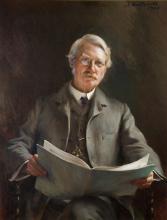William Warde Fowler, historian of Roman religion, was born at Langford Budville, Somerset on 16 May 1847. He was the second child of magistrate John Coke Fowler, who after the early death of his wife moved to South Wales and supplied his son’s early education. William was later sent to live with his grandfather so he could attend the school of Francis Kilvert at Bath. He was educated at Marlborough College (1860–1866) where he studied under Francis Edward Thompson. Fowler entered New College, Oxford, in 1866 and after a term won a scholarship at Lincoln College (1866–1870), where he became favorite and later friend of Mark Pattison, the rector, with whom he shared his interests in natural history and German scholarship. There he received a second class in classical moderations (1868), and a first class in literae humaniores (1870).
After a year as fellow of Lincoln (1872–1873), Fowler tutored ancient history at that college until 1910 and also taught students at Oriel. He liked to devote his afternoons to birds and his evenings to music, but still had a great deal of time to give to students. He always assigned his students original research, transforming the teaching of ancient history at Oxford. Beyond these duties, he was a curator of the Parks and the Botanic Garden in Oxford and in the same year was appointed as the first lay Sub-Rector in the history of the college, a position he held until 1904. He remained tutor until 1910 and in 1920 he was president of the Classical Association.
Fowler never married. After retiring to Kingham, he lived with his sister Alice and, after her death in 1917, with his two younger sisters until his death in 1921. Fowler was awarded an honorary LL.D. from Edinburgh and D.Litt. from Manchester.
Fowler’s works were varied. His love and pursuit of music made him publish a work on Mozart, his favorite composer. By long and patient observation, he became an authority on birds and their migrations. His early scholarship chiefly concentrated on natural history, but his most original works are his writings on Roman religion: Roman Festivals of the Period of the Republic (1899) and Roman Ideas of Deity in the Last Century Before the Christian Era (1914). His Gifford Lectures in 1909 and 1910 appeared one year later as The Religious Experience of the Roman People, from the Earliest Times to the Age of Augustus (1911). These works established Fowler’s reputation in Europe and America as an authority in this field. With James Frazer, Fowler was regarded as one of the leading experts of their generation in Roman religion. His central interest was in the influence of religious ceremony on the character of the Romans.
Some of Fowler’s other works in history and religion include: Julius Caesar and the Foundation of the Roman Imperial System (1892); The City-State of the Greeks and Romans: A Survey, Introductory to the Study of Ancient History (1893); Study of a Typical Mediaeval Village (1895); Social Life at Rome in the Age of Cicero (1908); Rome (1912); and Roman Essays and Interpretations (1920).



